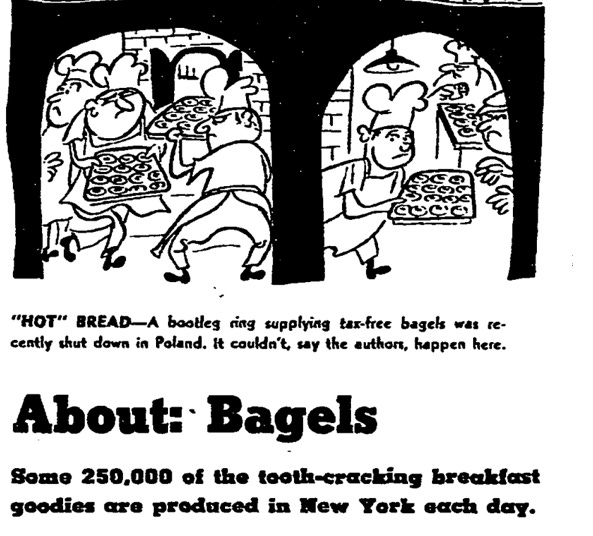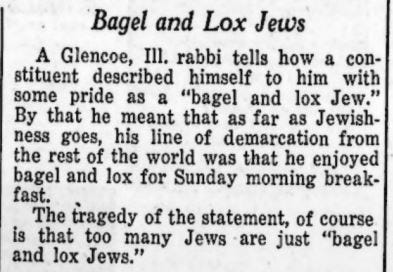"A bagel and lox Jew"
I came across the original "bagel and lox Jew" reference, and think it has something to teach about this moment when Jewish institutions are trying to define who is and who isn't adequately Jewish.
The further I get into this quest, the more I am convinced I can see the world through the hole of a bagel. I can certainly track anti-semitism. Case in point: There is a quote that shows up over and over again in articles about the bagel, it was a pithy phrase from the New York Times in 1960. The reporters described it as, the "bagel is an unsweetened doughnut with rigor mortis", and a staple of the Jewish diet. All true. Tracking down the original article, “About: Bagels”, the writers start by talking about a current bagel issue in the Polish city, Ostrowiec Świętokrzyski, then go on to say this: “And it seems that although most of the Jews have been gone from Ostrowiec Świętokrzyski. since WWII, the Gentiles had all become converts to bagels.” hmmm…I wonder where the Jews from this town went? Seems like a weird thing to omit the fact that most of the bagel loving Jewish community in the city were murdered just twenty years earlier? Another case in point: An article from the 1980s reporting that some of the folks in the Cranbrook school admission process drew a bagel next to the names of Jewish students. All these bagel related examples of anti-semitism have me thinking about definitions of anti-semitism.


It has not been lost on me that I am on this public facing Midwest bagel quest project at a moment in time where it feels complicated to be Jewish. I have never felt more out of step with mainstream Jewish institutions than I do right now. Institutions and leaders who are more than happy for the Trump administration to weaponize the definition of anti-semitism, to deport people from this country who are critical of the policies of the Israeli government. I keep thinking of a letter to the editor I found from 1946 from a rabbi in Glencoe, Illinois, he wrote about a member of his congregation who described himself with pride as a 'bagel and lox Jew.' It is essentially a letter where the rabbi yells about how there is a right and a wrong way to be Jewish. Which is how I think about most mainstream Jewish institutions at this moment. They are yelling about how if you protest Israel then you are protesting Jews. That we are one and the same. They are trying to redefine what it is to be Jewish and too bad if your own beliefs are outside that definition.
I always understood the phrase, 'bagel and lox Jew' to be a shorthand of sorts to describe someone who is a culturally identified and not a particularly religious Jew. Someone who had a bagel spread on Sunday but did not go to shul on Saturday. Whether this is an insult, praise, or benign is in the mind of the beholder. In this 1946 letter, the Glenco rabbi viewed ‘bagel and lox Jew’ as a tragedy and wrote, "Actually they have no Jewish consciousness at all. They have picked up a few affinities they might describe as Jewish but they are matters of habit, or of the palate. There is no Jewishness in their hearts or in their homes." The letter goes on but that is the gist of it. I was a bit surprised that this debate/argument was happening in 1946. I would have thought in the years immediately following the Holocaust we wouldn't be quibbling with who was Jewish enough.
But we were then and we are now. This has me thinking about how the Wexler Oral History Project (a project of the National Yiddish Book Center) lost a big chunk of money as a result of the Federal defunding of the National Endowment of the Humanities. I come from a Yiddish folksinger lineage. My mom’s oral history is one of the 1,000 interviews in that project, which illustrates an expansive view and the richness of Jewish history and culture. Jewish history is full of examples of how we survived by maintaining our traditions. I think it would do us Jews well to not police who is and who is not (metaphorically) a “bagel and lox” Jew. We have enough Tsuris (trouble) as it is.



